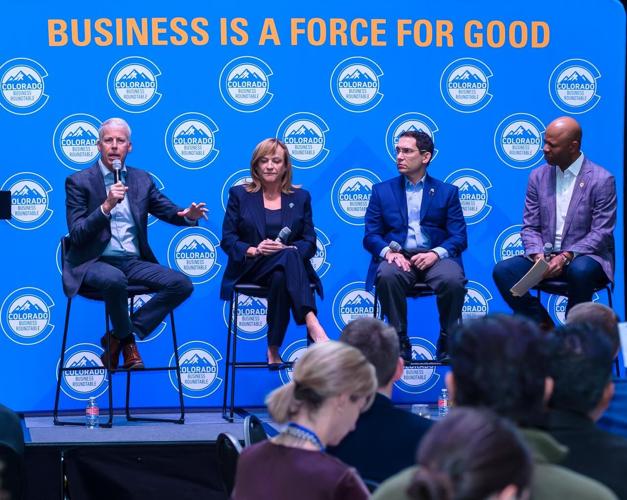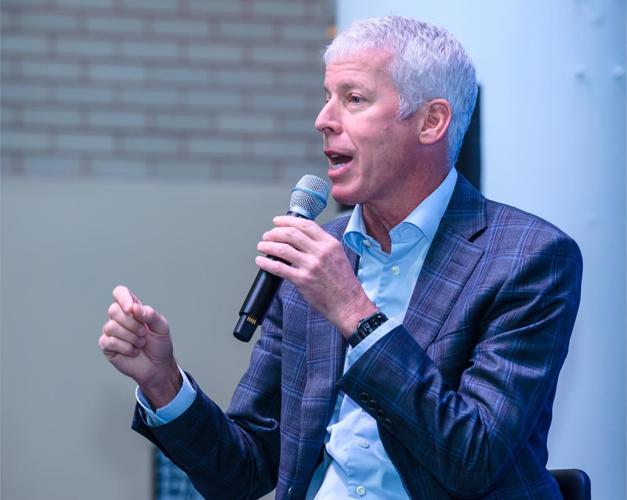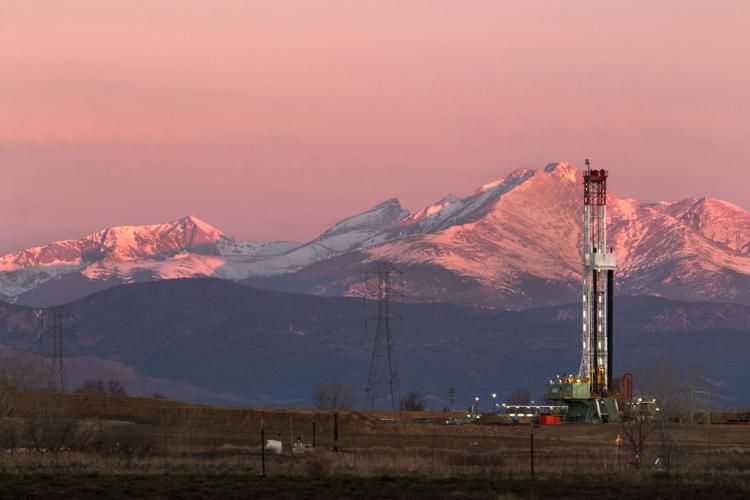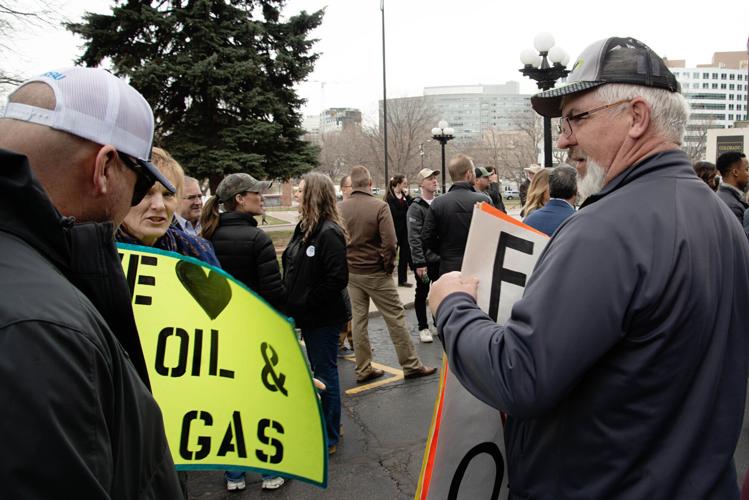Trump’s pick for energy secretary, Colorado’s Chris Wright, says the real crisis is ‘energy poverty’
President-elect Donald Trump’s pick for Secretary of Energy, Colorado’s Chris Wright, views the world divided between the haves and have-nots — with a specific eye toward access to energy, arguing that, instead of a “climate” agenda, America should focus on ensuring a wide array of cheap, abundant and sustainable energy sources that include geothermal, nuclear, oil and gas.
He argued that this approach is the antidote to what he described as an “energy crisis,” in which a minority of the world’s population has access to abundant energy, while the rest lives in “energy poverty.”
The approach, which he outlined in several articles for Colorado Politics and The Denver Gazette, will likely serve as a philosophical guidepost as he takes on the department that handles U.S. energy diplomacy, administers the Strategic Petroleum Reserve, which Trump has said he wants to replenish, and runs grant and loan programs to advance energy technologies, such as the Loan Programs Office.
Wright, who grew up in Colorado, founded Liberty Energy in 2011. The company, which specializes in well completion services and is valued at $2.8 billion, has become one of North America’s leading hydraulic fracturing companies.
Wright launched his career in energy by founding Pinnacle Technologies in 1992, a company specializing in hydraulic fracturing diagnostics, according to a profile on Liberty Energy’s website. Pinnacle played a pivotal role in advancing shale gas production by introducing technologies that improved resource extraction. Wright also served as chairman of Stroud Energy until its sale in 2006.
As Trump’s energy chief, Wright is expected to prioritize domestic energy production, support the oil and gas industry, and advance the policies of the newly established National Energy Council, led by North Dakota Gov. Doug Burgum.
Wright: There is ‘energy poverty,’ not ‘climate crisis’
Wright describes himself as “a tech nerd turned entrepreneur” who believes that more fossil fuel production can lift people out of poverty around the globe.
“His practical, all-of-the-above approach to advancing clean, affordable, and reliable energy solutions will be instrumental in shaping the future of our nation’s energy policy,” said Debbie Brown, president of the Colorado Business Roundtable. “His deep expertise and passion for the role of energy in enhancing human life will undoubtedly bring valuable perspective to this critical position.”
“As an entrepreneur, innovator, philanthropist, environmentalist, and business leader, Chris brings a wealth of experience and insight to tackling our country’s most pressing energy challenges,” Brown added.
Wright’s detractors insist that his vision for the nation’s energy future is a danger to the planet, calling him a “climate-denying Big Oil executive.”
“We all depend on clean water, clean air and a sustainable climate to thrive in. Chris Wright is the antithesis to this vision,” Garrett Royer, the Sierra Club Colorado’s acting chapter director, said in a statement to The Denver Gazette. “His industry is harming Colorado and now his nomination poses a massive threat to national energy policy that endangers the future of our planet.”
“Under the Trump administration, cronyism and corporate profit will be put before the interests of people and they will try to slow the inevitable transition to cheaper, renewable, and better sources of energy,” Royer said.
Meanwhile, industry and business leaders said Wright’s nomination is a big step forward in energy policy.
According to Wright, some in wealthy countries want to secure their safety and lifestyles at the expense of people in energy-poor developing countries.
In a series of articles published by the Gazette newspapers since 2021, Wright outlined his beliefs about energy policy and climate change.
“Roughly 1 billion, or 15 percent of the world’s population, live highly energized, wealthy, modern lifestyles recognizable to Coloradans. More than twice that many people — one third of the global population — cook their daily meals burning wood and dung and have either no electricity or only modest, intermittent access to electricity,” Wright wrote in 2021. “I can think of no starker illustration of the immense inequality in today’s world. This cannot stand.”
In another article, Wright said critics are missing the forest for the trees.
“The energy transition isn’t failing for lack of earnest effort. It is failing because energy is hard, and 3 billion people living in energy poverty are desperate for reliable and scalable energy sources,” Wright wrote in March 2022 in The Denver Gazette. “Meanwhile, 1 billion energy-rich people are resistant to diminishing their standard of living with higher cost and an increasingly unreliable energy diet.”
According to the World Health Organization, around 2.1 billion people worldwide burn solid fuels like wood, crop residue and animal dung in developing countries, including Indonesia, Africa and India. About 3.2 million of them die every year from diseases such as ischemic heart disease, stroke, lower respiratory infections, chronic obstructive pulmonary disease (COPD), and lung cancer.
“Energy poverty strikes me as a far more urgent issue for both environmental progress and bettering human lives,” Wright said in 2020. “The poorest third of humanity suffers from energy poverty, which brings both lethal health consequences and drives significant deforestation. In addition to three million deaths from indoor air pollution, energy poverty also limits access to clean water, education, and modern medical care.”
Wright said virtually everyone consumes oil and gas daily, even the desperately poor who are only indirect consumers via their food, clothes and housing.
“Nobody knows where the oil and gas was produced that filled their gas tank, heated their home, powered the hospital, or provided the plastics in their smartphones, kids’ toys or their hearing aid,” Wright said.
In another article, he said: “High energy and food price inflation is the cruelest form of tax on the poor.”
He also decried what he described as policies that have begun to “hamstring and squander the enormous benefits of the shale revolution.”
“The same misinformed anti-hydrocarbon crusade that impoverished Europe and made it heavily dependent on Russia is now sweeping the U.S.,” he said. “California and New England had already adopted European-style energy policies driving up electricity prices, reducing grid reliability, and driving manufacturing and other energy-intensive, blue-collar jobs out of their states. Colorado is not far behind.”
Critics: Wright has zero government experience
Slowing or stopping production of oil and gas in the U.S. will do nothing to improve environmental impacts but would pose larger problems for both local pollution and greenhouse gas emissions if production is moved to nations like Nigeria, Iraq, Russia or China, he said.
“In contrast, surging U.S. natural gas production has been the single-largest driving factor in the U.S. reducing our GHG emissions over the last decade — far more than any other nation,” Wright said. “In fact, U.S. GHG emissions have dropped by more than the next five leading nations combined.”
Critics pointed to Wright’s lack of experience in government as a disqualification for the position.
“It is not surprising, but still appalling that Trump’s pick for Secretary of Energy is a climate-denying Big Oil executive,” Tiernan Sittenfeld, senior vice president for government affairs for the League of Conservation Voters, said in a statement to The Denver Gazette. “With no experience in government, Wright will be primed to continue Trump’s and Project 2025’s extreme agenda of prioritizing Big Polluters over our families, communities, consumers, and the environment.”
Critics of the climate crisis paradigm have argued that countries, such as those in Africa, parts of South Asia, and Southeast Asia, face significant energy deficits, and transitioning to renewable energy sources alone may not meet their growing energy demands.
The Colorado Sierra Club characterized Wright and his beliefs as climate conspiracies and decried his nomination as energy chief.
“The oil and gas industry is a top contributor to severe air quality along the Front Range. These corporations drill under water resources and communities, spraying dangerous chemicals underground and creating harmful wastewater,” Royer said. “While some of our communities literally burned in wildfires, costing lives, billions of taxpayer dollars, and increasing insurance rates, Chris Wright pushed dangerous climate conspiracies.”
Business and industry offered the opposite opinion on Wright, seeing him as a compassionate and environmentally-aware business leader and philanthropist.
Wright founded the Bettering Human Lives Foundation, a nonprofit organization that “aims increase access to clean cooking fuels by directly supporting local innovators and entrepreneurs to start and grow their businesses.” The group seeks to provide families with a pathway out of “poverty through access to modern energy that betters human lives.”
“We at Colorado Concern have had the good fortune to work alongside Chris Wright for several years and we have benefited greatly from his insights and wisdom around energy policy,” Dave Davia, president and CEO of Colorado Concern, said in a statement. “Chris has a passion for the issues and a keen sense of the impacts that policy conversations around energy can have both domestically and globally and I am confident that this perspective will be invaluable as he takes on his new role at the Department of energy.”
The Associated Press contributed to this report.











